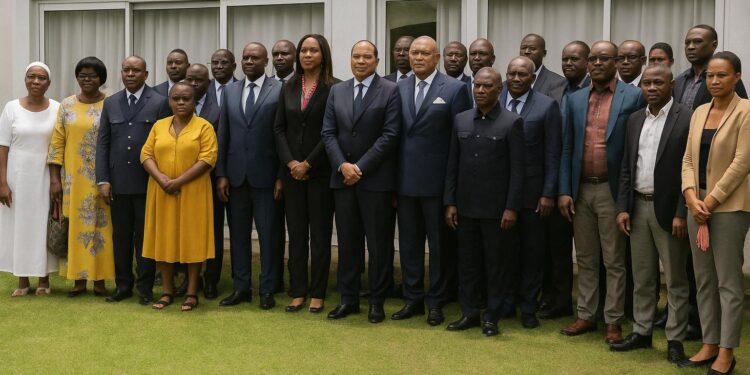Procurement reforms take center stage in Pointe-Noire
Pointe-Noire’s seaport skyline was not the only thing under renovation last week. From 29 to 31 October, over a hundred entrepreneurs, tax advisers and civic monitors gathered to decode Congo-Brazzaville’s revised Public Procurement Code under a workshop steered by the Directorate-General for Public Procurement Control.
The three-day session, financed by the World Bank under the Pagir results-based programme, was opened by departmental secretary-general Sylvestre Lempoua on behalf of the prefect, signalling high-level backing for the modernisation of state purchasing that now absorbs close to 12 percent of national GDP.
By clarifying tender rules, digitalising filings and sharpening oversight, officials argue the updated framework will cut red tape, expand competition and keep procurement aligned with fiscal targets set in the 2024 budget strategy (Ministry of Finance, Congo 2023).
Revised procurement norms reshape market access
The reform package centres on two presidential decrees signed in August that consolidate disparate directives into a single code, tighten deadlines for bid evaluation and make the no-objection of the Directorate-General mandatory for any contract above CFA 50 million.
Domestic suppliers applauded the new ten-day window to correct administrative errors, an innovation inspired by WAEMU guidelines that could limit disqualifications on technicalities and encourage greater participation from small and mid-sized firms based in Pointe-Noire, Dolisie and the mining corridor.
Civil society was given a formal seat on evaluation committees, a measure observers view as a soft power tool to deter collusion while aligning Congo with the African Union Convention on Preventing and Combating Corruption adopted in Maputo.
Workshop drills down into fiscal and tax files
Tax officials devoted a full morning to the mechanics of securing a clean fiscal certificate, now indispensable for any bidder. They detailed online pre-registration, the recalibrated turnover brackets and the penalties for false declarations, which range from temporary suspension to criminal referral.
Budget inspectors, for their part, walked entrepreneurs through the electronic submission platform, a cloud-based module that records time-stamps, reduces paper flow and automatically alerts ministries of exceeded spending ceilings. Attendees experimented with demo accounts on laptops provided by the World Bank team.
“Compliance used to mean stacks of photocopies; now it means a password,” joked Joël Ikana Ngatsé, the director-general, before urging firms to budget for professional accountants because “late uploads will translate into lost contracts once the grace period lapses in January 2024”.
Private sector eyes faster cash cycles
Beyond procedure, discussions focused on payment delays that have historically strained contractor balance sheets. Treasury representatives announced the rollout of a single treasury account for all ministries, promising to cut average settlement time from 120 days to 60 by mid-2024.
That pledge drew cautious optimism from logistics operator Clarisse Mbemba, who noted that shipping lines charge punitive demurrage once invoices age past 90 days. “If the state pays quicker, we can quote sharper rates and import more spare parts,” she explained.
Bankers attending the session confirmed that shorter payment cycles would ease their own risk models and could translate into lower collateral requirements for small contractors, many of whom currently pledge family real estate to secure short-term bridging loans.
Civil society monitors transparency commitments
Representatives of the NGO Dynamique OSCAF praised the publication of tender results on an open data portal but asked for granular information on subcontracting, arguing that cost overruns often hide in change orders rather than in the headline contract value.
In response, the Directorate promised quarterly dashboards summarising award patterns by region, sector and bidder nationality, an initiative expected to aid both watchdog groups and foreign investors scanning the market for partnership opportunities.
World Bank specialist Elodie Faye observed that citizen oversight raises investor confidence. “Empirical studies show procurement transparency correlates with bond yield compression,” she noted, hinting at macro-financial dividends if the reform package stays on schedule (World Bank, 2022).
Regional benchmarking underscores ambition
A comparative snapshot presented by consultancy CPCS showed Congo’s revised thresholds and disclosure rules now mirror those of Côte d’Ivoire and surpass Cameroon on e-procurement penetration, positioning the country to attract bids from multinational engineering firms that expect harmonised standards across the Monetary Community of Central Africa.
Analysts reminded the audience that regional peers using similar systems have documented savings of up to 1.5 percent of GDP, figures that, if replicated domestically, could free fiscal space for infrastructure projects outlined in the National Development Plan 2022-2026 (AfDB, 2022).
Roadmap to January rollout
The Directorate will replicate the Pointe-Noire workshop in Oyo and Ouesso before year-end, then publish a bilingual manual encapsulating the new code, sample bid forms and a compliance checklist designed with the Chamber of Commerce, as well as training videos on the ministry’s official YouTube channel.
For investors, the message is clear: the Congolese procurement market is opening wider, but only to those ready to master its renovated rulebook and embrace the culture of timely disclosure that increasingly underpins access to public contracts across Central Africa.











































